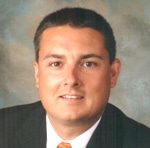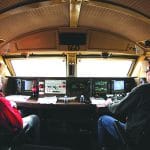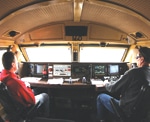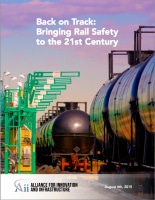On Wednesday, June 15, SMART Transportation Division and the Brotherhood of Locomotive Engineers and Trainmen (BLET) submitted their joint comments on the Federal Railroad Administration’s (FRA) proposed two-person crew rule.
While both unions strongly support the proposed rule, they suggested in their comments that the rule be made stronger before being made final.
“We firmly believe that the only safe way to operate a train is with a crew of at least two people – a federally certified locomotive engineer and a federally certified conductor,” the unions emphasized.
Click here to read the unions’ comments. Following the comments (on page 18) are the polling results of 11 individual states on two-person crews conducted by DFM Research on behalf of SMART TD.
Members, family, friends and communities can comment on the proposed rule until tonight at 11:59 p.m. eastern time and are encouraged to do so. Click here to comment.
Tag: two-person crews
Upon the urging of SMART, the Will County Board passed a resolution supporting the Federal Railroad Administration’s (FRA) proposed two-person crew rule. The deadline to submit comments on the propose rule is May 16, 2016. Click here to submit your comments.
Will County Board passes resolution supporting FRA’s proposed two-person crew rule

Guy
JOLIET, Ill.—A coordinated effort recently among SMART TD and SMART led to the passage of a resolution in support of FRA’s proposed two person crew rule by the Will County Board.
The resolution passed unanimously last Thursday at the regular meeting of the Will County Board after passing unanimously out of the Legislative Committee on April 12.
“When FRA announced its Notice of Proposed Rulemaking for two person crews, SMART TD State Directors were encouraged to garner support for the pending rule,” said SMART TD Illinois State Director Robert W. Guy.
“What better way to show support than by having a rail-intensive community pass a resolution in support of FRA’s proposed rule and submitting it as part of the docket,” Guy said.
The strong relationship between our Illinois members of SMART TD and SMART really paid off in this effort.
“Once we got our marching orders from our national legislative office I met with Don Moran,” Guy said. “Brother Don is a Business Representative for SMART Local 265 out of Carol Stream, but also serves on the Will County Board.”
“When I briefed Don on the pending rule he immediately saw the potential negative implications for his community should rail carriers be allowed to operate trains with a lone crew member,” Guy said. “He was more than happy to introduce and shepherd through the supportive resolution.”
“The overwhelming support for the resolution is a testament to Don’s hard work,” Guy said. “We owe a big thank you to Don and his colleagues on the Board.”
“The ground work that Don accomplished really showed when I addressed the Board at their meeting last week,” Guy said. “After explaining what the proposed rule would do the Board passed the resolution unanimously.”
That local support should way heavy on FRA when they consider all comments received in regards to the proposed rule. It’s communities like Will County that have the potential to suffer most if rail carriers are allowed to operate trains with one crew member.
“This kind of support reinforces the results of the extensive polling SMART-TD has conducted over the past few years regarding crew size,” Guy said. “Citizens overwhelmingly have shown that they don’t want trains running through their communities with less than two people on board.”
The Resolution as passed by the Will County Board:
RESOLUTION OF THE COUNTY BOARD
WILL COUNTY, ILLINOIS
Resolution in Support of FRA Crew Size Rule
WHEREAS, the safe operation of freight and passenger trains are vital to commerce; and Will County supports efforts to keep train operations safe in our (state, county)
WHEREAS, the Federal Railroad Administration (FRA) has published a notice of proposed rulemaking (NPRM) regarding adequate staffing on trains, a factor we believe is
vital to ensuring safe train operations; and
WHEREAS, national studies show that a minimum of two on-board crew members are vital to operate a train safely and minimize the likelihood of train-related accidents; and
WHEREAS, virtually all trains in North America are already operated by crews of at least two individuals, making the economic impact of this proposed rule minimal; and
WHEREAS, the FRA agrees that, while advancements in automated technology such as Positive Train Control (PTC) systems improve railroad safety, they are not a substitute for a train’s on-board crew members.
NOW, THEREFORE BE IT RESOLVED, that the Will County Board hereby supports the Federal Railroad Administration’s proposed ruling, requiring that trains operated in America be operated by no less than a two-person crew.
BE IT FURTHER RESOLVED, that the County Clerk shall send a copy of this Resolution to the United States Department of Transportation in the form of comments in support of the proposed federal rule.
BE IT FURTHER RESOLVED, that the Preamble of this Resolution is hereby adopted as if fully set herein. This Resolution shall be in full force and effect upon its passage and approval as provided by law.
On March 15th, the Federal Railroad Administration (FRA) issued a long overdue proposed regulation requiring that most trains in America have a minimum of two crewmembers. While SMART TD supports the core requirements of the rule, we believe that it can be strengthened and improved before this proposed regulation becomes final. We also expect the railroads to do everything in their power to weaken the rule. That is why we need your help. As a railroad worker, you have firsthand knowledge of the importance of two-person crews and the dangers of single-person operations. That is why the FRA needs to hear your voice on this critical safety issue. Please follow this link to submit your own comments on the rule, citing your personal experiences and expertise in operating trains. The most effective thing you can include in your comments is a personal story of how having two people on your crew prevented an accident from happening. It is not necessary to include all the details like train numbers or dates; just an overview of the incident and how having the second crew member made a difference. Examples of how the second crew member cleared a blocked crossing for an emergency vehicle or dealt with emergency responders during a derailment would also be very beneficial. No one can make a stronger case for two-person crews than those who work — or have worked — on the front lines operating trains every day. The deadline for comments has been extended to June 15, 2016 – more time to get your co-workers, friends, family members and community leaders to comment! Thank you for your help with this critically important issue. Below is an excellent example of a comment submitted by retired member Daniel Potaracke from Wisconsin: Agency: Federal Railroad Administration (FRA) Document Type: Rulemaking Title: Train Crew Staffing Document ID: FRA-2014-0033-0001 Thank You for this opportunity to comment on this important issue. I started on the BNSF RR in 1972 and retired in 2013 after 42 years of service. In 1972, I was one of 5 crew members on a train. When I retired, there were just 2 people on a train, the engineer and I the conductor. I’ve seen lots of changes on the railroad and that is putting it very mildly. With all the technology, you would think it would be safer but, I believe it has actually gotten less safe for a number of reasons. The railroads went from handling and hauling basic cargo and smaller trains to now handling much bigger trains with lots more dangerous cargo in increasing amounts. I remember having “a few” dangerous shipments but, when I retired, I was responsible for having LOTS of dangerous and hazardous cargoes. Just before I retired, I had to sift through lots and lots of paperwork to make sure I had ALL the information and redundancy so if there was a problem, I had some solutions for emergency workers and whomever needed it. I’m not saying it is bad but, making sure I had the paperwork and having someone else to count on made it somewhat better; and, how else are shippers going to transport these dangerous cargoes other than the nations highways? From what I’ve read about the trucking industry, with one person driving a huge truck with dangerous materials and the fatigue the truck drivers put up with, I’m amazed there aren’t more crashes. Having 2 people on a train is definitely much more safe! Having two sets of eyes and ears on the front end of ALL trains is essential for safety for everyone including the public, the employees and the railroads themselves. As a retired BNSF RR conductor, I’ve personally witnessed many “emergency” type incidents that warranted immediate attention and I’m not at all sure that they would have been caught by just one person. Splitting duties in such a way that there are two people onboard makes it easier for one of them to catch a problem vs having one person having so many things to be aware of and all at the same time. I know from personal experience that I’ve averted a few derailments or possible derailments because I’ve caught a problem on either my train or another passing train be it sticking brakes, cracked wheels or hot bearings and shifted loads or other problems. As you know, the railroads carry so many commodities that are very hazardous including oil trains that will burn out of control for days at a time, nuclear waste, chemicals that are certain death with contact or inhalation and munitions and explosives. Having two people on a train can catch a problem before a derailment with any of the above cargoes in a city or even out in the country where winds can blow dangerous inhalations to a city or town. Imagine a burning and exploding oil train in a congested city as big as Chicago or Minneapolis or even a small town where the entire population could be wiped out! We have all seen the images of burning oil trains; now imagine that in the middle of a city with populations living within a few hundred feet! I sometimes wonder if the railroad companies are like the automobile companies that work out the risks or odds of a derailment or toxic release or something similar where they cross their fingers and hope nothing happens but, if something did happen, the chances are 1 in X amount of percent, they could live with that and the resulting monetary damages…or deaths…or whatever. Please keep America safe with the railroads running safe with two people!

The proposed rule comes after a completed study by the FRA comparing two accidents: the Lac-Megantic, Quebec, derailment (operated by a one crewmember) and the Casselton, N.D. derailment (operated by three persons). After studying the two accidents, FRA determined that two-person crews are safer for all involved and published a proposed rule in the Federal Register.
Read more from People’s World.

Carl Smith, SMART TD Colo. state legislative director, released a statement today, acknowledging the victory, while reminding SMART members that the fight isn’t over, and urging them to contact their state senators to make sure the bill passes.
Click here to read the complete press release, and to obtain information on how to contact your state and federal representatives.

H.R. 3763 is the Surface Transportation Reauthorization and Reform Act of 2015, which was passed by the House Committee on Transportation and Infrastructure Thursday, Oct. 22. This bill contains language extending the PTC implementation deadline to 2018 with an additional two-year extension beyond that date.
Members, friends and family are urged to contact their House Representatives immediately to ask them to co-sponsor and support H.R. 1763, as well as its inclusion to H.R. 3763.
“Now is the time to take action and contact your congressional representatives about co-sponsoring H.R. 1763,” said Alternate National Legislative Director Greg Hynes. “It’s in the best interest of public safety and the safety of our members.”
Click here to search for your House Representatives by state.
Click here to send an email to your representatives, asking for their support of H.R. 1763 for railroaders.
Click here to send an email to your representatives, asking for their support of H.R. 1763 for family members and friends.

“The call to action is this: I am requesting that every member in Ohio contact the Senators of the Public Utilities Committee and urge them to support SB 229,” Gardner said. “Email and call your state senator and tell them you want them to support SB 229 for the safety of our members and the general public that reside near the railroad tracks.
“Your message should be short and concise and to the point. We want them to understand that this is an important safety issue to you, your family and the public.
“I want you to understand that this is the first step. We want SB 229 to pass through this committee with a majority of votes. If SB 229 doesn’t get the majority of the votes in committee, it will die then and there.”
Click here to find your district.
Click here to find your Ohio senators and representatives.
Click here for a sample email that you can send to your senator.
Click on these links for documents to attach to your email:
- SB 229
- Problems with single employee train crew operation
- Train crew job descriptions
- Two-person crew September 2015 survey results
Below are the members of the Public Utilities Committee and their contact information.

The study, which focuses largely on crude oil and hazardous shipments, gives real-world solutions that are intended to prevent accidents, rather than mitigate them. Included in that study is a recommendation for the Federal Railroad Administration (FRA) to require two-person crews (see page 14).
To view the report in its entirety, click here.

SMART Transportation Division National Legislative Director, John Risch, praised the new law: “I am very pleased that California has joined Wisconsin, Arizona and West Virginia in adopting these sensible requirements. This is a matter of public safety, plain and simple. Freight railroad operations are complex and often entail the transport of highly hazardous materials, such as crude oil, chlorine gas and many other chemicals; two crew members are vital to ensuring that these trains are operated safely and our communities are secure.”
Risch also praised those responsible for crafting and passing the legislation: “Many thanks go to Senator Lois Wolk for her sponsorship and to J.P. Jones and Mike Anderson of the SMART Transportation Division California State Legislative Board for their work explaining the importance of this legislation to California lawmakers.”
The law is supported by the California Public Utilities Commission (CPUC), which reports that of all the industries subject to its oversight – energy, water, telecommunications and transportation – rail accidents result in the greatest number of fatalities each year. In advocating for the bill, CPUC Deputy Director of the Office of Rail Safety, Paul King, said, “Senator Wolk’s bill would ensure that freight trains continue to have the safety redundancy that a second person provides. Such redundancy is a fundamental safety principle that is evidenced in certain industries, such as using two pilots in an airplane cockpit, or requiring back-up cooling systems for nuclear reactors.”
Congressman Don Young of Alaska has introduced legislation at the federal level – H.R. 1763, the Safe Freight Act – which would similarly require that all freight trains are operated by a minimum of two individuals, a certified conductor and a certified engineer. On April 14, 2015,
H.R. 1763 was referred to the House Transportation and Infrastructure Subcommittee on Railroads, Pipelines and Hazardous Materials.

